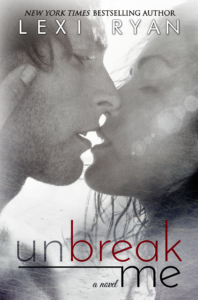New York Times and USA Today bestselling romance author Lexi Ryan’s novels (including UNBREAK ME, WISH I MAY and LOST IN ME) have been described as intense, emotional, and wickedly sexy. A former college professor, she now writes full-time from her home in Indiana, where she lives with her husband, two children, and a neurotic dog. Find her on Facebook or Twitter to chat about books, TV, and her children’s latest antics.
Loren Kleinman (LK): What is contemporary romance? What are its characteristics? What are its selling points?
Lexi Ryan (LR): Very simply, contemporary romance is the label given to romance novels that are not historical, paranormal, or suspense. These are characters set in the world we know, facing problems we’re all familiar with.
LK: How did you make the transition from college professor to full time writing? What advice could you give to other writers who are looking to make writing more of a full time profession?
LR: I was writing full time before I left my job as an English professor. The transition simply meant that instead of working two jobs, I was only working one. It meant waking up at 6am instead of 3am and hanging out with my kids and husband in the evening instead of locking myself in my office to get papers graded. To get the point where I could leave the college, we had to make a lot of sacrifices. I worked constantly to build my writing career so that I’d still be able to support my family when I left the day job.
My advice to people who want to make writing full time their profession?
1. Earn it. If you aren’t making time for it while you have the day job—even if it’s just ten, fifteen hours a week—you won’t make time for it when you’re doing it “full time.”
2. Pay off debt and be ruthless about money management. While no income is a sure thing, writing income is even less so. Being debt-free (or having minimal debt) will help in the lean months.
3. Write the stories you’re passionate about. They will resonate most with readers.
Perhaps the order I used above feels all out of whack, but I listed #3 last because it’s the easiest and comes the most naturally. I know that practical stuff isn’t what we want to hear when we’re chasing the dream, but that’s reality.
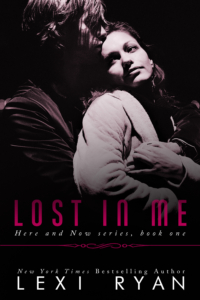
LR: Not anymore. Now I get to stay home and write all day. It’s glorious.
LK: Could you describe to us your typical writing day?
LR: I get the kids to school and preschool and get home around 8am. I usually catch up on email and social media while I eat breakfast and have coffee, and I try to start writing by 9am. Depending on where I am in my process, I might write for only two hours and then do administrative duties, or I might write until I have to get the kids from school. Then we have dance, swimming, homework, Boy Scouts, etc. We are just busy, busy in the evenings, like most families. Usually I’ll sneak in more social media and a little time on email after the kids go down.
LK: When did you learn you were a New York Times bestselling author? How much work goes into achieving this status?
LR: I hit the NYT list in February of 2013 then again in July of 2013. The first time I hit, Lauren Blakely tweeted at me, “Congrats on hitting the USA Today and NYT!” At the time, I was on my way home sick from work and I knew about the USA Today, but the NYT list hadn’t been released to the public yet. Now Lauren is now one of my dear friends, but at the time, I didn’t know her at all. I asked her if she knew something I didn’t know and she forwarded me the list, and I was sick as a dog, looking at it on my phone and wondering if it was all some big practical joke.
I’d been published since 2008 and only in the second half of 2012 did my sales finally start to pick up. It was thrilling and terrifying. Here I’d achieved this life long goal, but in the back of my mind I was wondering if I really deserved it. I think a lot of people feel that way—imposter syndrome—though we don’t talk about it much. The second time, however, it was much easier to enjoy.
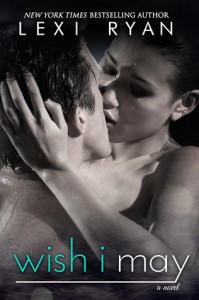
LR: I don’t think there’s a single “mother of romance.” The romance genre is like a family tree with new generations, one after another. If we were relying on the original mother to bear fruit and inspire new writers, we’d be stuck. For me, it was Jude Deveraux and Judith McNaught—I read everything of theirs I could get my hands on when I was in middle and high school. But there are plenty of writers younger than me for whom it was E.L. James, and those older than me often credit Woodiwiss. It doesn’t have to be a single person—we all come from different places in the evolution of the genre.
LK: Do you believe in an anti-heroine? How are your female protagonists different from traditional romance protagonists?
LR: I like to think of my female romance protagonists as more representative of than different from my generation of romance novels. They’re goal-oriented, they’re smart, they’re sexually experienced (solo if not with other men), and they’re unapologetic about their desires from the bedroom to their careers. These are the heroines I like to read about and the ones I like to write about.
LK: Do you believe in true love? What about a happily ever after?
LR: Yes to both. And, like in romance novels, both take work and dedication. This isn’t just a fantasy. I deeply believe we all deserve this kind of happiness and companionship. I’ve been married to an amazing man for 10 years, and I’m living it. It’s not easy every day but I always laugh when people imply that romance novels make it look “easy.” My characters have to go through a hell of a lot worse than most of us ever will.
LK: How does ownership play out in your books? Ownership of a partner? Ownership over bodies?
LR: This is a great question! As a feminist and a romance novelist, it’s probably one of my favorite issues to play with in my books. I believe romance novels show women with healthy conceptions of their own sexuality allow readers to take ownership of their own sexuality, bodies, desires, etc.
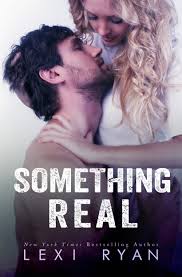
LR: In literature and in life, the truth has the power both hurt and liberate. Liberation isn’t painless.
LK: Do you believe a book dies once it’s born?
LR: I believe books are reborn every time they’re read.
LK: Did you know the titles of your books before you start writing?
LR: Usually I don’t, but now I have to plan so far out that I have to title later books in a series before I start writing.
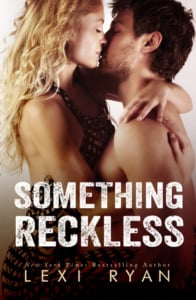
LR: It depends on the month. If I’m writing a lot and close to a deadline, it might take me over a month to finish one book. If I have a lighter writing schedule, I usually read a book a week.
LK: If I give you a time machine, what time period and in what place would you travel to?
LR: I’ve lived outside of the same little Indiana town all my life, and I hear it was HOPPING in the 1920’s. I’d love to go back to the roaring 20’s and check it out!
LK: What’s next for Lexi?
LR: lLast month I launched a new series, set in the fictional town of New Hope, Indiana, where I set most of my books. SOMETHING RECKLESS and SOMETHING REAL will continue with the sexy, emotional stories my readers of the New Hope books have come to love.

